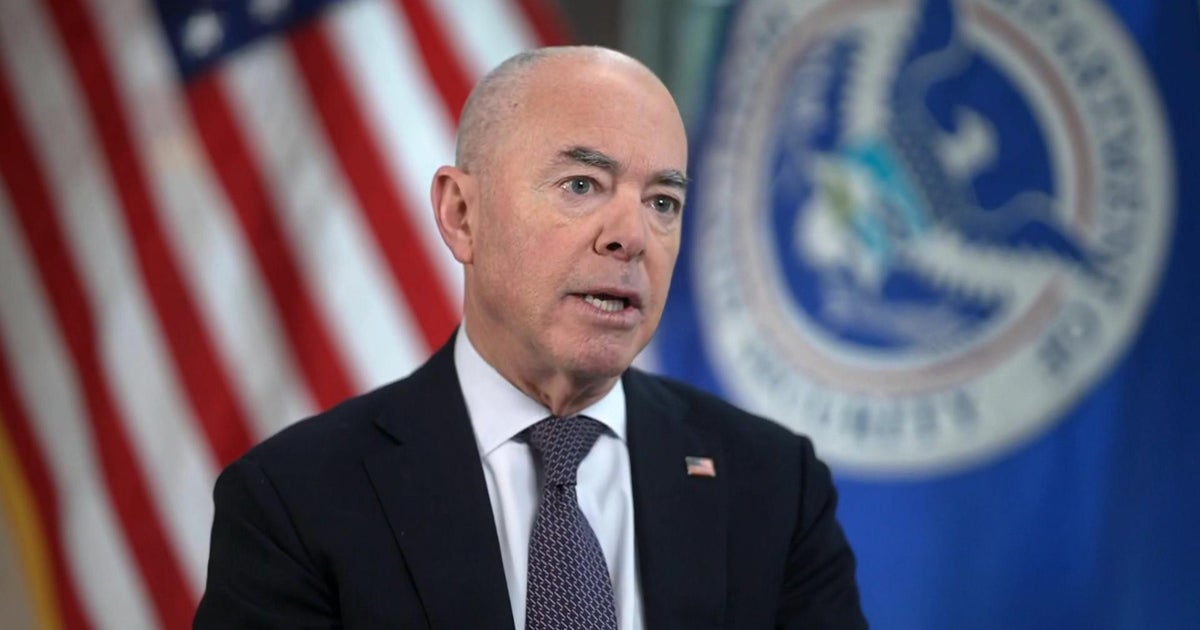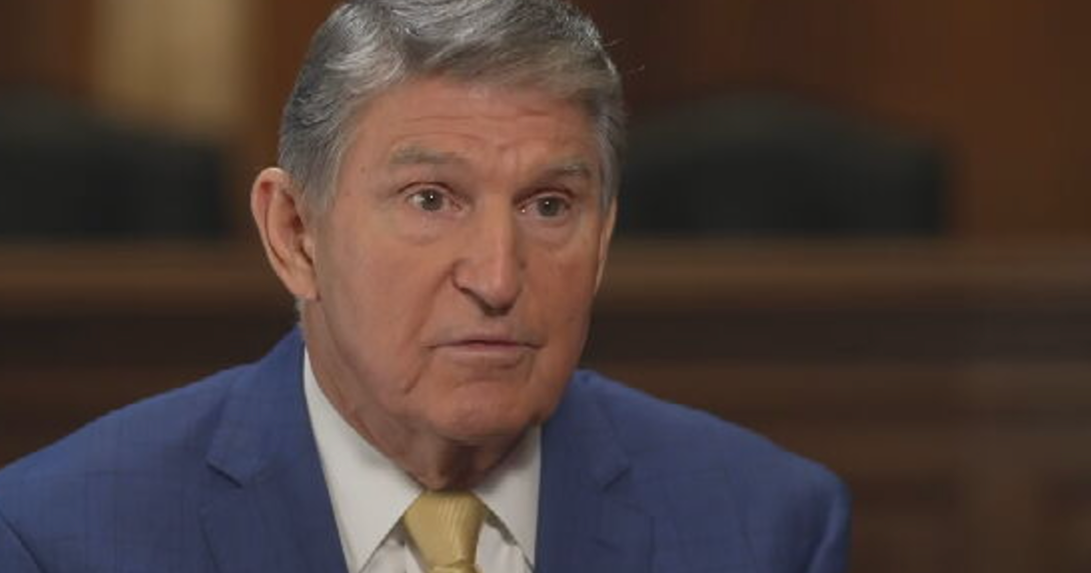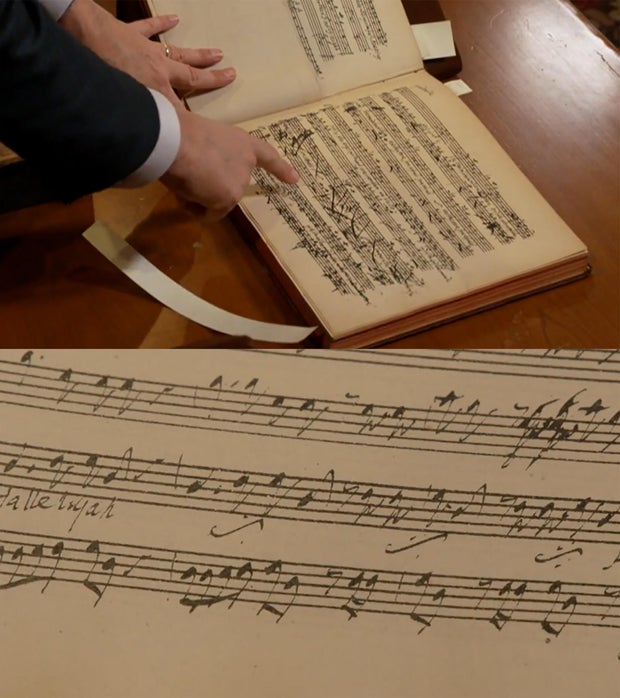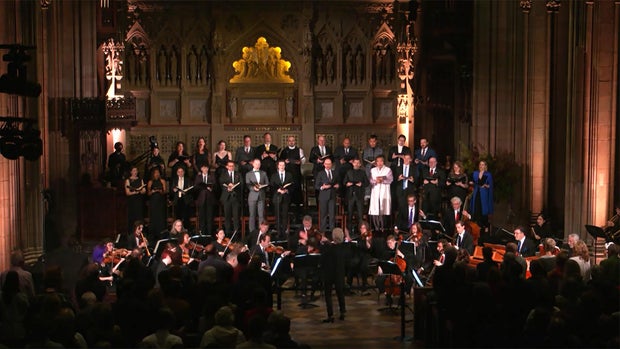CBS News
The story of Handel’s “Messiah”

It’s probably the most-heard piece of classical music on Earth, the most sung, and the most recorded. It’s “Messiah,” by German-British opera composer George Frideric Handel.
“It has been in near continuous performance from 1742, when it premiered, all the way up to the present,” said author Charles King. “It’s absolutely everywhere. And you can’t say that about really any other piece of serious music.”
CBS News
King’s new book, “Every Valley” (Doubleday), gives us the backstory of “Messiah” and its “Hallelujah Chorus,” which comes about two-thirds of the way through Handel’s oratorio. “It’s not the finale!” King said. “People start getting ready to leave, you know, grabbing their keys and their parking validation, and then it’s like, ‘Nope, sit down. There’s a third more of this thing left to go!'”
“Messiah” wasn’t actually Handel’s idea. The words came from a friend named Charles Jennens. King suggests it should really be called Handel’s and Jennens’ “Messiah.”
“Charles Jennens was a wealthy landowner, but he also suffered from this kind of encasing sense of doom and despair – we might now call it chronic depression or even bipolar disorder,” King said. “He starts to pull down books from the shelves, and he starts to copy down bits of scripture. He was also working out, I think, a kind of philosophy of living.”
Conductor and writer Jane Glover has conducted “Messiah” more than 100 times (most recently, this month at Trinity Church in New York City). “I never fail to doff my hat, actually, at Charles Jennens for putting that together,” she said. “‘Messiah'” is in three parts. The first part is the Christmas story, which is why everybody does it at Christmas. The second part is the crucifixion, but then also the resurrection; and then Part III is about redemption. So, there’s a tremendous shape to this three-part oratorio.”
Doubleday
In the 1720s and ’30s, Handel’s popular Italian-style operas had made him a musical megastar. But in his 50s, his popularity was waning. So, when he was invited to stage a series of concerts in Dublin, King said, Handel thought he could restart his career: “And so, he sits down with this text that he’s received from Charles Jennens and decides to try to make something of it. You can imagine him thinking, ‘Hmpf, what am I gonna do with these? I got a bunch of Bible verses in the wrong order that I’m supposed to set to Italian opera music?’ But he does it.”
In his book, King describes the final product as “weird.” “It is weird,” he laughed. “It’s the strangest thing that Handel ever composed.”
Handel wrote the three-hour piece (for chorus, soloists, and nine-piece orchestra) in 24 days … 260 pages of music!
At the Morgan Library & Museum in New York, music curator Robin McClellan showed me a replica of Handel’s original score. “It shows the speed that he wrote. It’s so messy!” McClellan laughed. “He really was concerned with getting his ideas onto paper as fast as possible.”
For the “Hallelujah Chorus,” Handel wrote the word “Hallelujah” once … and then used the standard jazz repeat sign that we still use today! “He’s writing down the musical equivalent of ‘et cetera, et cetera, et cetera,'” said King. “In that era, there was really no assumption that anything would ever be performed again.”
CBS News
“Messiah” was a huge hit in Dublin, and, eventually, in London. It seems to offer a sense of hope and light at a time when they were in short supply.
King said, “‘Messiah’ was born in the kind of dark shadows of the Enlightenment. Britain was at war. The infant mortality rate in London at the time was 75%. And so, ‘Messiah’ is a kind of piece of art that is grappling with what basis, what possible basis for hope could there be when you have all of this evidence around you to suggest otherwise?”
Just about everyone loved it – except Charles Jennens! “He was worried that Handel had done a kind of cheap job,” said King. “He says, ‘I am never going to offer my words to Handel again to be so abused!'”
Handel agreed to make some changes, and Jennens softened. “In the end, he wrote to a friend of his that he thought it was ‘in the main, a fine composition,'” King said.
“Messiah” came to the American colonies in 1770, six years before this was even a country. It was performed in Trinity Church in New York City, sounding much as it did this month in exactly the same hall.
Trinity Church
Over time, “Messiah” has changed in all kinds of different ways. Handel’s nine-piece orchestra gave way to thunderous musical forces; various trims were implemented. Glover said, “People sitting in a church on hard pews don’t want to sit here for three-and-a-half hours.”
And whole sections were dropped. “Some people just do Part I at Christmas; that’s a very good way of doing it,” Glover said.
Still, in all its versions, Handel and Jennens’s masterpiece has offered the same message for nearly 300 years: That there is always hope.
“Every single generation that has heard this thing, has felt that this music is kind of a message in a bottle for them,” said King. “It’s a piece of music that does stuff to us.”
Its message? “Have the possibility of hope; problems are solvable; the world is gonna be okay. And then, take that and put it into action.”
For more info:
Story produced by Sara Kugel. Editor: Carol Ross.
CBS News
12/22: Face the Nation – CBS News

Watch CBS News
Be the first to know
Get browser notifications for breaking news, live events, and exclusive reporting.
CBS News
Biden’s DHS Secretary says a “terrific solution” to immigration surge was killed by “irresponsible politics”

Washington — Department of Homeland Security Secretary Alejandro Mayorkas said as his time at the helm of the nation’s immigration enforcement comes to a close that “a really terrific solution was killed by irresponsible politics” when the bipartisan border deal fell apart earlier this year.
Mayorkas pointed to the agreement on a border package reached by a bipartisan group of Senate negotiators in February reached after months of deliberations that would have marked the first comprehensive border security policy overhaul in decades — and give the president far-reaching powers to clamp down on unlawful border crossings. But the bill was quickly rejected by Republicans after President-elect Donald Trump expressed his opposition.
Following the legislation’s failure, the Biden administration instituted asylum restrictions that dramatically cut off the flow of immigration. When asked about the timing amid criticism from Republicans that the Biden administration possessed the authority without Congress to act on the border, Mayorkas acknowledged that the administration may have taken the action more quickly if they knew the border deal would be torpedoed.
“Looking back now in hindsight, in 2020 if we had known that irresponsible politics would have killed what was clearly a meritorious effort and a meritorious result, perhaps we would have taken executive action more rapidly,” Mayorkas said in an interview that aired on “Face the Nation with Margaret Brennan.”
The comments come as border crossings have dropped to the lowest level of the Biden administration, after reaching record highs a year ago.
The Homeland Security Secretary noted that before Mr. Biden came into office, the “trend lines of migration” were increasing exponentially in 2018 and 2019 worldwide, “and then the COVID-19 pandemic hit.” He added over time, the Biden administration built up capabilities that have allowed it to transport individuals and decompress areas seeing surges in immigration, saying that “we’ve been executing on enforcement at an unprecedented level throughout this administration.”
“We are now removing or returning more individuals in three years than the prior administration did in four, and we are doing so not only greater in volume, but greater in speed, because of the negotiations with other countries and to more countries than has ever been the case,” Mayorkas said.
CBS News
Sen. Joe Manchin on his time in the Senate and what the future holds

Sen. Joe Manchin hasn’t quite figured out what he’ll do next once he leaves the Senate next month.
But whatever his future holds, he plans to keep hosting his former colleagues Congress on his popular houseboat in West Virginia. Manchin has for years hosted politicians of both parties aboard the “Almost Heaven,” which has been docked in Washington, his way of bringing his colleagues on both sides of the aisle together.
“I’m going to be involved,” Manchin told CBS News’ “Face the Nation with Margaret Brennan.” “The boat’s staying here.”
Manchin, who mulled an independent presidential bid this year, said he would have “loved to have had a platform” to speak centrist common sense, as he put it.
He expressed hope for President-elect Donald Trump’s success — despite previously saying that electing Trump would be “very detrimental” to the country. Manchin has said the rioting at the Capitol on Jan. 6, 2021, was a “bridge too far” for him.
“When the people speak and they make their choice and the election’s over, you better pray with everything you have the president will be successful,” Manchin told Brennan. “And if you’re in a position to help, you have knowledge of how the system works and can make it work, do it. … This is about our country, and I want him to succeed, and I have said this to him, I’ll do whatever I can to help in any way humanly possible.”
Manchin was West Virginia’s governor before he won his U.S. Senate seat in 2010. Since then, he’s tried to work with both parties. He formally left the Democratic Party in May, registering as an independent.
Manchin is still hoping to push a bill to ease the permitting process for the energy industry through Congress. He said he encouraged Trump to make it happen during a conversation at the Army-Navy game in Maryland last weekend.
His Energy Permitting Reform Act of 2024 would facilitate a faster permitting process for oil and natural gas, renewable energy, mineral mining and transmission lines. It hasn’t progressed in the Democratic-controlled Senate.
Manchin said he’s hoping Trump will watch his interview with “Face the Nation” and take a serious look at his bill.
“So now with this interview, I’m hoping, I’m asking President Trump to truly look at this permitting bill, because it is basically a good piece of legislation that we’ve never moved this far in a bipartisan way, with John Barrasso, going to be the No. 2 man in the Republican Senate, a good person, a good friend of mine,” Manchin told Brennan. “We worked hard and negotiated hard, and have a good bill. It’s ready to go. We have the bill ready. He could just drop it in.”
Manchin said he thinks Trump understands the political realities at play in Washington better than he did when he won in 2016. And the reality is that the Senate remains more independent than the House, he said.
“I think he understands it an awful lot better now than he did in 2016 when he won the first time,” Manchin said. “So now he’s got some experience under him. He understands the process, but he understands, also, the power that he’s wielding right now, the influence he has” with the House and Senate, which will be in Republican hands in January. Manchin wants to keep the filibuster in place; it requires most bills to reach a 60-vote threshold for consideration.
“I think there’s enough Republican senators and Democrat senators too, but Republicans have control because they’re the majority, that are not going to let the filibuster blow apart,” Manchin said. “… I don’t think they will do that. And it only takes five, or it takes four, I’m sorry, it takes four Republican senators, just four, and I guarantee you, I think there’s a lot more than four.”
Those Republicans, he said, will “protect the institution.”
“They’ve been here long enough,” Manchin said. “What goes around comes around, and in two years, this thing could flip — 2026, you never know. It’s the power of the people.”
contributed to this report.







